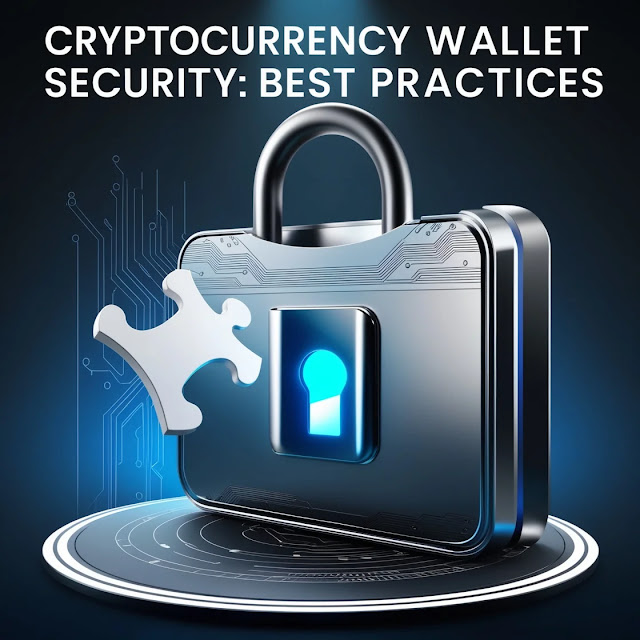Cryptocurrency Wallet Security: Best Practices
In the digital world of cryptocurrency, security is paramount. Cryptocurrency wallets—whether software, hardware, or paper-based—are vulnerable to various security threats, including hacking and phishing. Ensuring the security of your crypto wallet involves understanding potential risks, selecting secure wallets, and adopting best practices. This guide on "Cryptocurrency Wallet Security: Best Practices" provides essential steps and tips to protect your digital assets from unauthorized access and loss.
 |
| Cryptocurrency Wallet Security: Best Practices |
Types of Cryptocurrency Wallets
Cryptocurrency wallets come in various forms, each with unique security features and accessibility. Understanding these types helps users choose the most secure option for their needs.
Software Wallets
Software wallets are applications that can be installed on a desktop, mobile, or online platform. Although convenient, they may be vulnerable to malware and hacking if not protected properly.
Hardware Wallets
Hardware wallets are physical devices that store cryptocurrency offline, providing high security. They are considered one of the safest options, as they remain immune to online attacks.
Paper Wallets
Paper wallets involve printing private keys on a physical document, offering offline storage. However, they can be lost or damaged, making them less practical for long-term use.
Best Practices for Cryptocurrency Wallet Security
Following best practices can significantly enhance the security of your cryptocurrency wallet, protecting it from unauthorized access.
Use Strong, Unique Passwords
Creating strong, unique passwords is essential for protecting your wallet. Avoid using common words, birthdates, or easily guessed information.
Enable Two-Factor Authentication (2FA)
Two-factor authentication adds an additional security layer. With 2FA, access requires a second step, often a mobile device verification, which secures accounts against unauthorized access.
Keep Software Updated
Updating wallet software and firmware regularly ensures you benefit from the latest security patches, protecting your wallet from known vulnerabilities.
Back Up Your Wallet
Regularly back up your wallet to ensure you can recover assets if your primary device is lost or damaged. Store backups in secure, offline locations.
Common Security Threats to Cryptocurrency Wallets
Various threats can compromise the security of cryptocurrency wallets. Understanding these threats is essential for protecting your assets.
Phishing Attacks
Phishing involves tricking users into providing sensitive information through fake emails or websites. Be cautious of unsolicited communications.
Malware and Viruses
Malicious software can capture sensitive data, such as passwords and keys, from infected devices. Use reputable antivirus software and avoid suspicious downloads.
Physical Theft
Hardware wallets, paper wallets, and other physical storage methods are susceptible to theft. Store them securely in a safe place.
Choosing a Secure Wallet
Selecting a reliable wallet provider is essential. Consider a wallet that offers robust security features, good reputation, and positive user reviews.
Check for Reputation and Reviews
Before selecting a wallet, research its background and user reviews. A wallet with a strong reputation is likely to have dependable security.
Opt for Open-Source Wallets
Open-source wallets allow the code to be inspected by the public, ensuring transparency in their security measures.
Additional Tips for Secure Crypto Management
Implementing extra measures can help reinforce your cryptocurrency security strategy.
Avoid Public Wi-Fi
Public Wi-Fi networks are not secure for cryptocurrency transactions. Use a private and secured network to access your wallet.
Use Cold Storage for Long-Term Holdings
Cold storage, such as hardware or paper wallets, is ideal for holding large amounts of cryptocurrency offline for long-term investments.
Beware of Social Engineering Scams
Attackers may try to gain access to your wallet by manipulating you into revealing sensitive information. Stay cautious of unsolicited requests for information.
FAQs
How often should I update my wallet software?
It's recommended to update your wallet software as soon as new versions are released, as updates often contain security patches.
Is it safe to store my private keys online?
Storing private keys online is not recommended. Use offline storage methods, such as hardware or paper wallets, for better security.
What is the best way to back up a cryptocurrency wallet?
The best backup method depends on your wallet type. Generally, using secure external storage, such as encrypted USB drives, is advisable.
Can I recover a stolen cryptocurrency wallet?
In most cases, stolen cryptocurrency cannot be recovered, making it vital to prioritize wallet security and preventive measures.
Conclusion
Protecting your cryptocurrency wallet is crucial for safeguarding your digital assets. By choosing a secure wallet type, implementing best practices, and being aware of common threats, you can significantly reduce the risk of unauthorized access and potential losses. Follow these guidelines for Cryptocurrency Wallet Security: Best Practices to keep your investments safe and secure.





